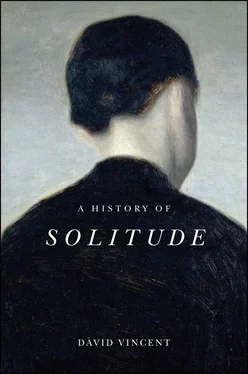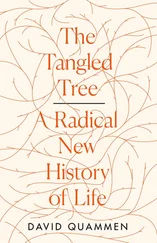Once he had negotiated the kind of withdrawal with which any writer was familiar, Zimmermann’s catalogue of solitude became increasingly negative. At best he had an understanding of the circumstances that could cause a rejection of society, at worst he was wholly critical of both motive and outcome. He lived a life, like Montaigne before him, where the deaths of partners, children, and friends were a constant threat to the maintenance of any intimate relations. 33According to Samuel-Auguste Tissot, a fellow Swiss doctor and lifelong friend, his first wife suffered ‘a nervous disorder, which added infinitely to Zimmermann’s sorrows, [and] made him wish more earnestly for retirement’. 34He was later widowed and lost his daughter from his first marriage. Whilst he could scarcely commend the state, he was well aware of the presence of what in our own time would be termed bereavement: ‘Solitude is often terrible to the mourner, whose happiness is buried in an untimely grave; who would give all the joys of earth, for one accent of the beloved voice, whose tuneful vibrations must never more fill his ear and heart with rapture; and who, when alone, languishes with the remembrance of his irreparable loss.’ 35Those connected with the sufferer could do what they could to ease them back to society; Zimmermann himself later remarried, and, claimed Tissot, ‘the happiness of this union was never disturbed for a moment’. 36
There were other kinds of misfortune which, as in the case of Rousseau, might propel the individual into retirement. ‘A wounded spirit,’ Zimmermann wrote, ‘seeks shelter in the lenient repose of privacy, from the shocks of rivalry, the intrusion of misguided friendship, and malicious assaults of secret or avowed enmity.’ 37Such people, too, deserved sympathy, though not imitation. Beyond those forced into retreat through no fault of their own, there were the many individuals who were thrust into it by misconduct or inadvisably chose the condition. The most amorphous group were those who had failed to meet the ethical standards or behavioural demands of eighteenth-century society. It took a certain level of self-belief to participate in domestic, commercial, or political networks. Once this was lost by defeat or moral shortcoming, withdrawal was the looming prospect:
Shame or remorse, a poignant sense of past follies, the regret of disappointed hope, or the lassitude of sickness, may so wound or enervate the soul, that it shall shrink from the sight and touch of its equals, and retire to bleed and languish, unmolested, except by its internal cares, in the coverts of solitude. In these instances, the disposition to retreat is not an active impulse of the mind to self-collection; but a fearful and pusillanimous aversion from the shocks and the attrition of society. 38
In contrast to the elite souls who chose a temporary retreat the better to engage with the highest endeavours of their time, these were outcasts, driven from company by a sense of their own demerits.
The category of exile overlapped with the pathological condition of melancholy. In eighteenth-century intellectual culture, there were no hard boundaries between the sciences, literature, and philosophy. Zimmermann’s excursions into poetry, political commentary, and guides to living were bound up with his principal occupational identity as a doctor. His first publication was a treatise on ‘Irritability’, referring not to short temper but to the functioning of the nerves of the heart. He brought to solitude his experience as a leading medical authority, and his discussion of melancholy was later cited by Jean-Étienne Dominique Esquirol, the mid-nineteenth-authority on mental illness, as a key contribution to the topic. 39Melancholy had been a nosological term for two millennia, encompassing sadness, fear, and depression. 40During Zimmermann’s working life, the psychological causes were increasingly foregrounded over the physiological, which traditionally had been located in an excess of black bile. 41A related category was that of hypochondria, or hypochondriasis, from which Tissot claimed Zimmermann himself intermittently suffered. This lacked the modern association of imaginary illness but referred instead to a collection of symptoms for which there were no evident physical causes. 42The conditions were at the centre of a growing interest in the capacity of states of mind to generate bodily malfunctions. In his Anatomy of Melancholy , Burton observed that ‘the Minde most effectually workes upon the Body, producing by his passions and perturbations, miraculous alterations, as Melancholy, Despaire, cruell diseases, and sometimes death it selfe’. 43His speculation received increasing medical support. As Thomas Trotter excitedly wrote in 1812, ‘at the beginning of the nineteenth century, we do not hesitate to affirm, that nervous disorders have now taken the place of fevers, and may be justly reckoned two thirds of the whole, with which civilized society is afflicted’. 44
So broad a collection of ailments had no single diagnosis or prognosis, but a pronounced rejection of society featured in every account and at every stage of the illness. According to Zimmermann,
An unseasonable and ungovernable propensity to Solitude is one of the most general and unequivocal symptoms of melancholy: all those whose feelings are a prey to images of chagrin, regret, and disappointment, shun the light of heaven, and the aspect of man; incapable of attaching themselves to any ideas but those which torment and destroy them, they fly the necessity of efforts at once painful and ineffectual. 45
The withdrawal from company was often the first visible sign of a looming mental crisis. ‘When persons begin to be melancholy,’ observed William Buchan’s contemporary bestseller Domestic Medicine , ‘they are dull, dejected, timorous, watchful, fond of solitude, fretful, fickle, captious, and inquisitive, solicitous about trifles, sometimes niggardly, at other times prodigal.’ 46Increasingly the sufferer could find no source of pleasure except in the denial of intercourse with those who might have been able to help them out of their deepening depression. Philippe Pinel’s influential Treatise on Insanity of 1801, set out for the coming century the principal characteristics of the illness: ‘The symptoms generally comprehended by the term melancholia are taciturnity, a thoughtful pensive air, gloomy suspicions, and a love of solitude.’ 47How an individual arranged his or her social life was now the legitimate concern of European doctors. Too much time alone immediately raised warning flags. Medical textbooks routinely devoted a section on solitude in their advice on the causes and treatment of the most pervasive form of mental illness. Pathological melancholy was distinguished from the increasingly fashionable ‘white’ melancholy, a condition professed by those with a pronounced literary sensibility, denoting a low-key withdrawal for the purpose of observing the lessons of nature and the rural world. 48Thomas Gray, author of the most widely read poem on country life in the second half of the eighteenth century, mocked his own predilections:
Mine, you are to know, is a white Melancholy, or rather Leucocholy for the most part; which though it seldom laughs or dances, not ever amounts to what calls Joy or Pleasure, yet is a good easy sort of a state, and ca ne laisse que de s’amuser. The only fault of it is insipidity; which is apt now and then to give a sort of Ennui. 49
‘Black’ melancholy was altogether more serious, a one-way journey towards a complete breakdown of mental and physical health.
As a doctor, Zimmermann could take a practical view of the pathologies of solitary living, seeking to reduce their incidence through medical intervention and published writings. It was otherwise with his final category of negative solitude, which he treated with unremitting hostility throughout his treatise. His tour of the landscape concluded with its spiritual dimension:
Читать дальше












